The Legacy of Idriss Deby
Lt Gen. Abakar M. Abdallah (May 2021)
.jpg)
Marshal Idriss Déby Itno, President of the Republic of Chad
On April 19, 2021, there were two victories in Chad. The Chadian army under the command of President Idriss Déby Itno destroyed an invasion by a rebel force column of the Front for Change and Concord in Chad (FACT) from its base in the mountains of southern Libya. Simultaneously, the formidable long term Chadian leader scored a second victory- his sixth Presidential re-election on a near unanimous vote. Videos showed captured FACT rebels and destroyed vehicles surrounded by cheering Chadian soldiers.
Those victories were fleeting given an announcement the following day that Déby had succumbed to wounds after being allegedly shot during a visit to front-line troops. The sorrowful TV announcement of the 68-year old Déby’s passing was made the following day on April 20, 2021 by Army spokesperson General Azem Bermandao Agouna for the Transitional Military Council (TMC):

Members of Transitional Military Council document by Chad Television on April 20, 2021
“The president of the republic, head of state, supreme chief of the army Marshal Idriss Déby Itno just drew his last breath while defending the nation’s integrity on the battlefield,” Agouna, wearing a red beret and army fatigues, said surrounded by generals.
Included in the announcement was a letter signed by the 15 military officers, members of the TMC headed by his 37-year-old son, General Mahamat “Kaka” Idriss Déby as Interim President until elections for a successor to his late father are held. The younger Gen. Déby was previously in command of operations in neighboring Mali contending with Jihadist threats.
According to an Al Jazeera report, the TMC announcement also laid out the changes in governance.
Here is what the army announced about the post-Idriss Déby era:
- The dissolution of the government and the national assembly
- General Mahamat “Kaka” to head 18-month transitional council
- Instead of the current constitution, a transitional charter to be put in place by the head of the council.
- Fourteen-day national mourning period
- Closure of land and air borders
- Nationwide curfew imposed from 6pm to 5am
- New republican institutions to be put in place to facilitate the transition with the organization of free, fair democratic and transparent elections.
“The National Council of Transition reassures the Chadian people that all measures have been taken to guarantee peace, security and the republican order,” Agouna said.
The announcement objective was to ensure continuity of leadership of Chad’s combat – tested Army as the leading edge of the 5-G Force supported by France and the US to prevent an Islamist takeover of the strategic Sahel region of Africa. The realities are that Chad maybe on the edge of a period of instability and uncertainty following the 30 – year reign of former strongman President Idriss Déby.
Family Feuds, Opposition Criticisms and Divisions in the Military
Prior to the TMC issuing its declarations, there were reports of a “scuffle” over succession at the Presidential Palace between Mahamat “Kaka” Idriss Déby and his step – brother Zakaria, appointed by his late father as Ambassador to the UAE in 2017. However, those reports appeared to be rumors launched by the oppositions.
Additionally, the announcements by the Chadian Army TMC set off a wave of accusations of a military “coup” by parliamentary opposition in the capitol of N’Djamena. Under the constitution, the speaker of the legislative assembly would succeed if the President died until national elections occurred within 3 months. The BBC reported a dissident Chadian General Abderamane Dicko former rebel leader and leader of military opposed to Mahamat Idriss Déby’s Appointment who denounced the TMC’s appointment of him as “a grouping of a few friends” and has called for “the quick formation of a broad, inclusive consultation before the country sinks into chaos”.
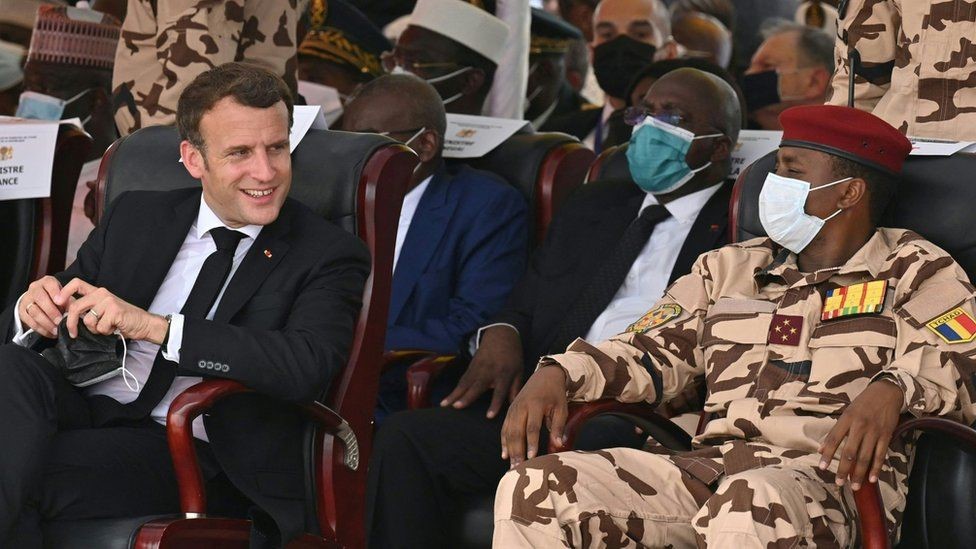
President Macron of France with Interim President Mahmat Idriss “Kaka” Déby at the State Funeral for his late father President Idriss Déby, N’Djamena, Chad, April 23, 2021 (Source: Reuters)
Concerns for Stability in Chad and continuing French Support expressed at State Funeral.
Obi Anyadike in The New Humanitarian article, “Death of Déby leaves big worries in Chad and beyond ” noted the question of continuing French support for Chad:
The sudden death of Chadian leader Idriss Déby after more than 30 years in power is a seismic event domestically, but it also has major security implications for the Sahelian region, where Déby was seen as the lynchpin of Western-backed efforts to battle jihadist groups.
[…]
A potential French withdrawal from its politically unpopular military intervention hinges on regional forces carrying a larger share of the burden – and Chad had recently contributed 1,200 troops to the G5 and its counter-insurgency action in Burkina Faso, Mali, and Niger.
The Chadian military is also operating in the Lake Chad Basin as a member of the Multi-National Joint Task Force comprised of Nigerian and Nigeran forces based in Baga-Kawa, Nigeria. The Task Force is combating Boko Haram and its splinter group the “Islamic State of West Africa Province.”
Former President Idriss Déby had been an ally of France and the US in combating Islamist terrorism in the G-5 nations. After French-led operations to quell Islamist rebels in Mali in 2013, that Chad contributed 2,000 troops, in 2014, France reinforced its military bases in Chad with 5,100 troops in Operation Barkhane to fight Islamist Jihadists in the Sahel. France has also provided weapons, intelligence, and air support for this effort. Those commitments were front and center in French President Macron’s presentation at the state funeral with thousands in attendance for President Idriss Déby on April 23, 2021. On the dais were interim President -designee General Mahamat Idriss Déby the leaders of the G-5 countries from Burkina Faso, Mali, Mauritania, and Niger, “facing Islamist groups, some of which are linked to al-Qaeda and others the Islamic State group”. Reuters noted these themes in Macron’s remarks:
France will not let anybody put into question or threaten today or tomorrow Chad’s stability and integrity,
France will also be there to keep alive without waiting the promise of a peaceful Chad creating a place for all its children and components. “The transition will have this role to play stability, inclusion, dialogue and democratic transition. We are and will stand alongside you”.
He called former President Déby, a “friend” and “courageous” soldier, who had given his life for his country.
I share the bereavement of a nation touched to its core by the sacrifice of its first soldier and I share the bereavement of a loyal friend and ally because you were the first to respond to the call of regional countries to defend Africa against armed terrorism in the Sahel in 2013, a reference to Chad forces joining France in Mali to counter an Islamist insurgency.
Calls for Transition to eventual Civilian government
Macron’s call for democratic transition reflected concerns voiced by France, Chad opposition, the African Union, and the Catholic Bishops. Reuters reported that French Presidential “sources” that discussions in meetings with Sahel leaders attending the Funeral in N’Djamena for the late President Déby stressed the need for a “mixed” civilian – military transition. A leading opposition politician, Succes Masra, who was barred from the April 2021 elections, endorsed that further advocating for a civilian interim president with a vice president named by the military”. The 15 nation African Union’s Peace and Security Council statements released after the funeral expressed “grave concern” about the military takeover instead urging the authorities to “expeditiously” move to hand power over to civilians. The Catholic Bishops of Chad offered similar statements. Christians represent over 23 percent of the country’s 16 million population are predominately live in Sothern Chad.
As reported by CNA in a statement signed by Bishop said they were joining “their voices to that of all Chadian men and women to call for an inclusive national dialogue which should be a dialogue of reconciliation.”
“This inclusive national dialogue for reconciliation is today a necessity for lasting peace in our country,” they said.
“It is necessary that all the warring parties unilaterally declare a cease-fire without conditions and drop their weapons.” The statement was signed by Archbishop Edmond Djitangar Goetbé, archbishop of N’Djamena and president of the Episcopal Conference of Chad.
In partial recognition of these criticisms, the Transitional Military Council announced as interim Prime Minister Albert Pahimi Padacke, the presidential runner-up. That was still deemed evidence of a “military coup”.
The week following the state funeral, protests erupted against the interim government of the Transition Military in N’Djamena and in the country’s South. Security forces put down those protests, 2 were killed and 27 were injured. Reuters noted condemnation of the violence by French President Macron. “Macron added, as he hosted Democratic Republic of Congo President Felix Tshisekedi at a meeting in Paris, that he remained in favor of a peaceful transition in Chad, and that France would work with international partners in the region to improve the situation in the country.”
Given the continuing operations against the FACT rebel force, the calls for inclusion of civilian figures in a TMC- led government, let alone a cease fire appear doubtful. FACT spokesperson, Kingabe Ogouzene de Tapoi in a press statement declared, “we are preparing to advance…We don’t accept any military government”. He left no details.
Who are the FACT rebels that Chad is fighting?
The Front for Change and Concord in Chad (FACT) was formed in 2016 by dissident Chadian military drawing support from some individual members of the tribes. It has operated from bases in the Tibesti mountain area along the border region of Libya and Chad. The launching of FACT operations in northwest Tibesti region on Chad’s Election Day April 11, 2021 was poised to overthrow Déby’s government. On Monday April 19, 2021, Al Jazeera reported that Chadian operation resulted in “more than 300 rebels neutralized” and claimed the lives of “five martyrs” or government troops. Chadian army spokesman General Agouna told AFP that “36 soldiers had been wounded in the fighting and 150 FACT rebels had taken prisoner, including three senior officers”. Notwithstanding, Chadian military stated that operations against the rebel group in both Tibesti and Kanem provinces were over. The three columns of FACT rebels infiltrated from Niger Chad borders were destroyed dismantled and hundreds of its members are neutralized or captured. The FACT spokesperson threatened to continue the drive south to the capital of N’Djamena, but ‘halted’ in respect of the former President funeral. Following the funeral, FACT changed its message to “they were ready for cease fire and peace talks”. The realities are that currently FACT has no presence inside the borders of Chad. Moreover, the Transitional Military Council rejected the FACT message instead demanding the suspension of hostilities.
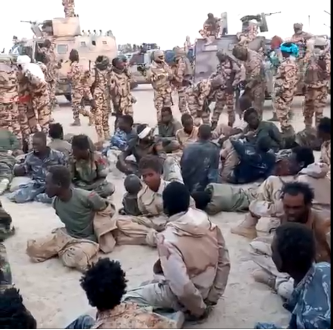
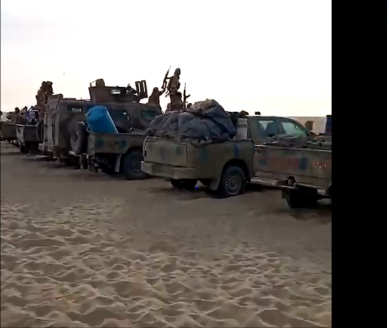
FACT dissident soldiers and material captured by Chadian troops on April 21, 2021 on the border of Niger Chad.
Following the reported death of former President Déby, Chadian army conducted cleanup operations. The remaining FACT rebels had been pursued by Chadian forces since Monday morning of the day President Déby was shot. FACT infiltrated Niger trying to reach their bases in Libya. They ran out of fuel and water. They were captured by Chadian forces without resistance close to Niger Libya border. 50 Vehicles and many dissident soldiers were captured. Unfortunately, many died for lack of water. Rumors loomed that Mhadi, their leader was evacuated by an Egyptian military transport plane C-130 Hercules from Jufura Airfield in Libya to Egypt. That he died of injuries he sustained during the clashes with Chadian forces. However, these rumors have yet to be confirmed by reports of his passing.
FACT had a “no conflict” agreement with eastern Libyan strongman General Khalifa Hafter of the Libyan National Agent, a former US resident and CIA resource. The irony is that Hafter has been supported in part by France because of the threat of the Libyan Islamist National government supported by Qatar and Turkey. That despite an alleged UN-brokered cease fire agreement. Hafter has received material weapons and logistic support that has also supported FACT.
Hemeti’s Connections with the Oil Rich Middle East Sheiks Threaten Déby Regime
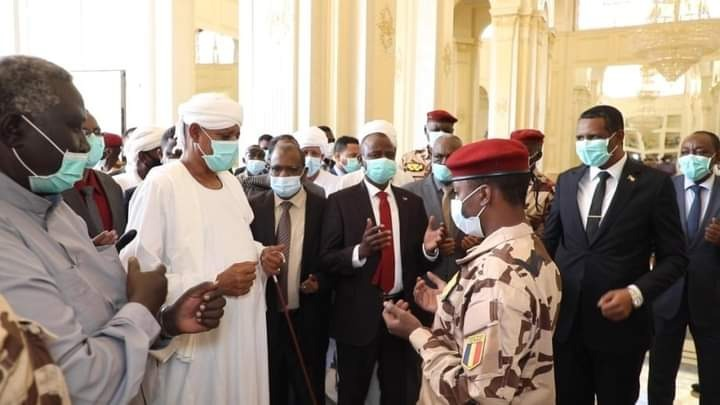
General Mohamed Hamdan Degalo (Hemeti) and Sheik Musa Hilal offer condolences to the President of Chad, April 27, 2021.
Following the state funeral for former Chad President Idriss Déby, Saudi Royals King Salman and Crown Prince Mohammed bin Salman cabled official condolences to his son Interim President General Mahamat, head of the Transitional Military Council.
The king said: “We have received with great sorrow the news of the death of President Idriss Déby Itno, and we send you, the family of the deceased, and the Chadian people our warmest condolences and sincere sympathy.”
On the heels of those official declarations, a Royal Saudi airplane transported a large Sudanese delegation from capitol Khartoum to Ndjamena. Sudan RSF/Janjaweed Commander and Deputy of Sudan Transitional Military Council Gen. Mohammed Hamdan Degalo “Hemeti” was accompanied by Musa Hilal Arab Tribal leader involved in Darfur atrocities. According to a Reuters report, Hilul was pardoned in March 2021 by the Transitional Military Council after four years of detention. It noted: “Degalo and Hilal, who both hail from the Arab Rizeigat tribe, remain in competition for political and economic influence in Darfur. Both have held gold mining interests in the Darfur region.”
The irony is that Degalo arrested Hilal in late 2017, after he had turned against former Sudan President Bashir who was overthrow and imprisoned in April 2019. Despite the pardon Hilal remained under a UN sanction and travel ban. The flight to Chad may be in violation of that ban. This despite reports that RSF/Janjaweed militias participated in the attacks in Chad. Those reports further indicated that some Janjaweed commanders such as Anor Guba with other militia members who allegedly participated in the operation were captured or neutralized. Voice recorded messages indicated that people on the ground saw the arrival of about 50 vehicles transported injured FACT soldiers from the battle ground in Chad to Zuruk, in North Darfur.
Zuruk was Zaghawa land in Darfur before the Janjaweed conducted ethnic cleansing operations and displaced its population. Hemeti succeeded by forcibly settling Janjaweed families come from Chad, Mali, and Niger. Through funding provided by Qatar, the UAE, and Saudi Arabia, Hemeti’s family is currently constructing a military airfield in Zuruk under the pretext of development. Further evidence of the Sudan TMC support for Chad opposition fighters came from other reports. Approximately 100 trucks loaded with weapons and munitions were sent from Khartoum to Libya. Sources said those convoys were headed to Tibesti in the Northern part of Chad, Libya and possibly to Niger. This was not the first time Janjaweed militias travelled across the region. When the French and Chadian forces bombarded Jihadists in Northern Mali in 2013, a group of over 2,000 militants with their equipment infiltrated through Libya and entered Darfur. That was the force former President Bashir used to create the Rapid Support Force. Was the condolence call a ‘coverup’ feigning sympathy to gain an assessment of the current state of the interim regime for possible future operations? Either way, the Janjaweed remain a compelling threat to Chad and the Sahel. These are not the only terrorist groups that the Khartoum regime has been hosting in Darfur.
Who was former Chad President Idriss Déby?
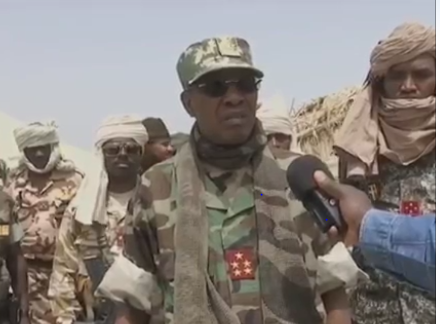
President Idris Déby Itno leading Chadian troops fighting against Boko Haram, Lake Basin in April 2020.
(Source: Chad Television)
Déby, was the embodiment of the Chadian Army prominence as the “fighting President.” Déby was the son of an impoverished Herder of the Zaghawa people who bestride the Chad and Sudan borders. There are 4 million Zaghawa people split between Eastern Chad and Western Darfur. The Zaghawa are known as tough fighters in the region. Zaghawa called him Magiry, meaning “President “or the “King.” Déby chose the pathway to power by entering the Chadian Military Academy becoming a pilot trained by the French. Additionally, he attended French military War College (Ecole de Guerre). He also was a military strategist and tactician of note. He created a mobile fighting force using Toyota pickups fitting out with dual machine guns and missiles adaptable to fighting in the semi-arid regions. That force defeating the Libyans under Gaddafi in the 1987 “Toyota War”. Déby was the Chadian Army Joint Chief of Staff. Through the support of Gaddafi, he ousted the long-term Chadian autocrat Hesseine Habre in a 1990 coup leading rebel forces based in the Darfur region of Western Sudan. Habre was exiled to Senegal. Habre was convicted in 2016 of war crimes, crimes against humanity and torture during eight years of repression in the 1980s. In 1990, Déby entered the capital of N’Djamena in triumph. In 1996, he held the first multi-party races and won his first term as elected President. He won a contested re-election in 2001 against the backdrop of opposition accusations of fraud. In 2005, he engineered a change in the constitution eliminating term limits. That triggered a decade long series of rebellions by disaffected military. One of those, in 2008 reached the Presidential Place that required French intervention to rescue him.
.png)
Captured FACT rebels
Déby, a physically tall and commanding presence embodied these qualities that he instilled in his commanders and troops. That was vividly displayed in an operation that he led in April 2020 against Boko Haram who infiltrated the Lake Chad Basin that lies at the conjunction of the borders of Northern Nigeria, Chad, Niger, and Cameroon. That campaign was triggered in late March 2020 by Boko Haram that resulted in the deaths of 156 Chadian forces. Déby, led from the front, often taking over from subordinate commanders. The three-week operations resulted in the deaths of over 1,000 Boko Haram jihadists at the cost of 52 lives of Chadian soldiers. That fighting spirit and commitment to cleanse the Sahel of Jihadists was reflected in his victory remarks to the assembled troops:
Our objective was to destroy Boko Haram inside our national territory. Today, I can assure you, Chadians, there is not a single Boko Haram in the entire zone bordering Cameroon, Nigeria, and Niger. We have achieved our objectives. All the zones are controlled and occupied by our military command. We have seriously destroyed Boko Haram. Those few that were left escaped to Nigeria and Niger. We will continue to clear them out. We have finished our operations regarding our country. There is not a single terrorist left. Since we engaged with Boko Haram wars, Chad is the only one country that carried the burden. Chadians shed blood and seriously paid the price. We must stay vigilant. They might come back. Because of this reason I have instructed the commander of Multi-National Joint Task Force to continue the operations and engage other countries such as Nigeria, Cameroon, and Niger because the terrorists recognize no borders. That is the reason we prefer to maintain our forces inside Niger and Nigeria.
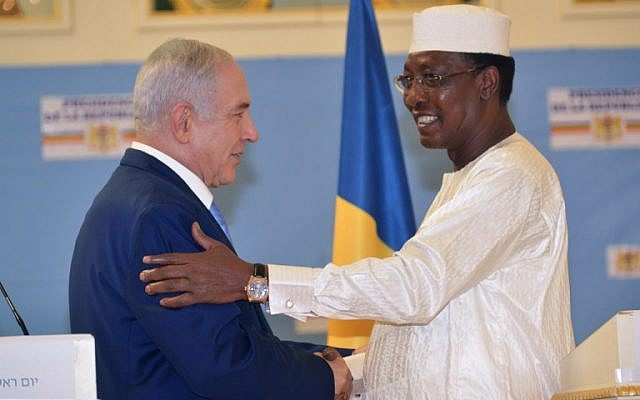
Israeli Prime Minister and former Chad President Idriss Déby at Presidential Palace N’Djamena, Chad, January 20, 2019. (Brahim Adij/AFP)
Déby was also a canny diplomat. His November 2018 visit to meet both Israeli Prime Minister Netanyahu and President Rivlin culminated two years of secret meetings and discussions. That led to a meeting with Netanyahu in January 2019 to conclude several agreements re-establishing diplomatic relations and trade likely including weapons and intelligence sharing, as well as, facilitating access to the US. This landmark agreement was a precursor of several similar agreements with the UAE, Bahrain, Morocco, and neighboring Sudan- the so-called Abraham Accords. The Prime Minister of Israel tweeted:
I send my deepest condolences to the people of Chad on the passing of President Idriss Déby. We will miss his bold leadership and always remember his historic decision to renew Chad’s relationship with Israel.
The Israel Hayom daily “cited sources in the Israeli National Security Council predicting that the change of power wouldn’t damage Israel’s new and close ties with Chad, and that the new president would continue with the policy adopted by his father.”
However, at the end of his 30-year reign as Chad’s former President Déby leaves behind unresolved crises and lack of effective development of the country are energy resources placing the 16 million Chadian population near the bottom of the world development index. He did not effectively develop those resources concentrating instead in piling on $4 billion in debt in 2004 to build a pipeline to the Atlantic Coast. He was also accused of amassing a $50 million personal fortune from alleged corrupt practices. Then there is the unresolved crisis of the more than 470, 000 UN refugees in Chad from surrounding countries in the Sahel, Sudan, Cameroon, Central African Republic, Niger, and Nigeria.
The real problems are filling the evident power vacuum with his untested son as interim President and threats from FACT, supplied with equipment from Libyan strongman, Libyan National Army General Khalifa Hafter and sponsor the United Arab Republic. FACT incursions that began on April 11, 2021 that resulted in the last battle victory by Déby and the Chad army, are only a hiatus as more columns are poised to head south towards the capitol of N’Djamena seeking to overthrown and replace their hated ‘dynastic monarchy”.
There is also the threat posed by Sudan’s General Mohammad Hamdan Degalo “Hemeti” the RSF/Janjaweed militias that seek to exploit the current power vacuum and possibly invade Chad during this dangerous period of uncertainty.
The FACT and Sudan threats might place pressure on the interim regime in N’Djamena to withdraw Chadian forces that comprise the backbone of the Multi-National Task Force as well as G5 Forces combating Jihadists of Boko Haram and the Islamic State in West Africa Province in Niger, Nigeria, Mali, and Burkina Faso.
In recognition of these concerns, Nigerian President Muhammadu Buhari a former Army Major General, in a virtual meeting with Secretary of State Antony Blinken urged the US to move the Africa Command from Stuttgart, Germany to the African continent. A readout from the meeting noted his rationale:
The security challenges in Nigeria remain of great concern to us and impact it more negatively by existing complex negative pressures in the Sahel, Central and West Africa, as well as the Lake Chad Region,” added the president, who is also a retired major general.
The support of important and strategic partners like United States cannot be overstated as the consequences of insecurity will affect all nations, hence the imperative for concern, cooperation, and collaboration of all nations to overcome these challenges.
To address these issues regarding the legacy of the late Chadian Strongman President Idriss Déby, we interviewed our colleague, Lt. General Abakar M. Abdallah. General Abakar was the initial commander of the Pan-Sahel Initiative Unit and was a Coordinator of the Multi-National Joint Task Force based in Lake Chad. He is a US trained intelligence, security and counter terrorism expert and graduate of the US Army War College and the College of International Security Affairs. He is by origin a Zaghawa from Darfur. He is the Chairman of Sudan United Movement and co-author of Genocide in Sudan: Caliphate Threatens Africa and the World with this writer and Deborah Martin, JAD Publishing, 2017.
1. How were you a Darfuri from the Sudan able to join the Chad Army?
Déby was suspected of a failed coup attempt in Ndjamena against Hisseine Habre in 1989, the Former Chadian President. He fled to Sudan while Chadian forces pursued trying to capture or neutralize him. However, he and some of his men managed to infiltrate into Northern Darfur, the center of Zaghawa land in Western Sudan. With the permission of Omar al Bashir, then President of the Sudan, Habre’s forces entered Darfur searching for Déby and his men. Instead of fighting Déby’s rebels, the invaders attacked and burned villages killing people. They committed wide actions of torture, plunder, and punitive executions around Funo in North Darfur. Habre’s troops also arrested 190 people, mostly from the Zaghawa people, and took them to Chad where they were tortured and killed. This was the main reason that I and many other Zaghawa people in Darfur joined and fought on the side of Déby’s resistance movement that ultimately removed one of Africa’s brutal dictators from power.
2. When did you meet late President of Chad, Idriss Déby?
The first time I met with President Déby was in 1989 when he was the Chairman of the Patriotic Salvation Movement known in French as Mouvement patriotique du salut (MPS) when he was in exile from Chad based in Darfur. During those days, I was a member of the Sudan People’s Liberation Army (SPLA) sent from Nuba Mountains by Dr. John Garange, Chairman of the Sudan People’s Liberation Movement (SPLM) to establish SPLA bases and recruit Darfuris into the movement.
3. What was it like to serve in the Chad Army under his command?
It was a great experience serving in Chadian National Army under Déby’s command. I learned a lot from his strategies and tactics. Especially how to deal with political and military opponents. One of his grand strategies was that he never closed the door for dialogue or negotiations with his opponents. He strictly adhered to the policy of “no permanent enemy or friend but permanent interest”. Dealing with his opponents, Déby used both carrot and stick strategies, persuasion, and mediations to achieve his objectives. Déby was a man who had great experience in both politics and war, especially irregular warfare. He had a strong sense of judgment and determination. He was the kind of person that controlled every aspect of his command and liked to see his orders strictly executed without objections raised about his decisions.
4. How were you selected for US intelligence and counterterrorism training?
I was selected based on my service in the Chadian Army, my competence in collecting and analyzing intelligence information, knowing the Sahel region, and success in my intelligence professional assignments.
5. What other US Army senior officer training did you receive?
I attended the College of International Security Affairs, National Defense University, Washington, DC. The US Army War College, Carlisle Barracks in Pennsylvania, and several seminars on International Legal and the rule of Law in the United States Institute of International Legal Studies in Rhode Island. Furthermore, I was trained by US Marine Corps and Navy Seals mobile teams in Counterterrorism tactics in Chad. Additionally, I attended seminars on peace building, enforcement, and rules of engagement at the United States Institute of Peace in Washington, DC, and on terrorism, law enforcement and good governance presented by mobile teams from Naval Postgraduate School in California and New York Police Department in Chad.
6. When were you given the assignment to form the Pan-Sahel Counterterrorism Unit and what was its mission and relation to the G-Force?
Following the September 9/11 terrorists’ attacks, the US government offered to train a company size military unit under a counterterrorism program called Pan-Sahel Initiative (PSI) in each of the four Africa Sahel Region countries: Chad, Niger, Mali, and Mauritania. During that period, I was attending a Counter Terrorism Course in the College of International Security Affairs in Washington, DC. President Déby ordered the Joint Chief of Staff to assign me the responsibility as I had gone to US for training. He told him to wait for my return as there was no other competent officers to command such an important program. On my return, the Joint Chief of Staff informed me of the situation and instructed me to contact the US military attaché to discuss the program with him. Because Chad is a semi-arid desert country with open and long borders, I realized that a company size force was too small. I changed the plan from a company to brigade size unit. The Americans accepted my request and began training the first battalion and it continued from there.
7. What were the unit’s significant contributions to combating Jihadist Islamist groups in the Pan-Sahel region?
The PSI unit began its first operations against Chadian rebels, including Janjaweed militias, in Eastern Chad in 2006. The unit demonstrated its capabilities in the operation against insurgency. President Déby began to depend on the PSI unit to combat Chadian rebels. When the Jihadists overran North Mali in 2013, French troops intervened with high technology and superior military equipment. The French force faced difficulties to enter caves in the mountains to dislodge terrorists. They requested Déby’s intervention. This was the first time the PSI unit was deployed abroad. They attacked the terrorists in their caves neutralizing large numbers including Moctar bin Moctar, the famous terrorist leader who had been operating for years and held several European hostages in the Africa Sahel. The PSI unit also captured several terrorists. Since then, the PSI unit remained in Mali to the present day under the command of G-5 Force. When Boko Haram overran Northern Nigeria and Cameroon, they called upon Chadian Army intervention. Again, the PSI unit was deployed dislodge Boko Harm and killed its leader Abakar Shikau. The counterterrorism unit of Chad today is deployed in Nigeria, Niger, Mali, and Burkina Faso.
8. The Zaghawa tribe background that you shared with the Late President Déby occupies adjacent areas in both Chad and Sudan. What makes the Zaghawa tribe “tough” fighters? Is that why he was “fighting” President leading battles against both rebels and counterterrorism battles against Jihadists in the Sahel?
Bravery, resilience, and courage are basic to Zaghawa nature and tradition. Throughout the history of the region Zaghawa bravery is well known by Sudanese, Chadians, and Libyans. Zaghawa served as commanders in the Kingdoms of Ouadai, Fur and in Mahdism. Furthermore, Zaghawa proved to be good warriors in tribal wars. This is something that is inbred in the Zaghawa people. Despite Zaghawa being known as tough fighters, President Déby was a battle tested fighter throughout his service in the Chadian military. Prior to becoming President, Déby fostered two rebellions. In both cases he emerged victorious by backing Habre in power and overthrowing him as well. Déby served as a Chairman of Joint Chiefs of Staff with President Habre for over 6 years. The first was in 1982 when he was the Chairman of Joint Chief of Staff of the rebel force that overthrew Koukouni Ouadai from power; while in the second, he was the head of the MPS revolution that ousted Habre in 1990.
9. Who are the Chadian FACT rebels based in the Mountains of Libya and who is supporting them?
The Chadian FACT rebels are a collection of various Chad rebel groups recruited by several oil rich Middle East Arab countries in the past few years and reinforced by Sudan Janjaweed militias endeavoring to overthrow governments in the Africa Sahel region.
10. Why did the Chadian Military appoint the late President Déby’s on Gen. Mahamat Idriss “Kaka” as his successor to command the Army and what is his field Experience?
I think one important factor appointing General Mahamat Déby to lead the country at this difficult movement is that he is a unifying figure, especially in the armed forces. His appointment has been accepted by most people. With the army united around him, he can preserve the unity and security of the country which is the most important issue at this moment. What General Déby may lack in both educational background and professional military training, he has made up serving under his late father commanding military units. Conducting those military and counterterrorism operations provided him with ample command and warfighting experience.
11. Why will Chad be governed under the Transitional Military Council for 18 months prior to new elections?
Event though, Chad had been under President Déby’s rule for over 30 years; the country remained with a handful of armed rebellions. The country has political opposition groups that disagree on who might lead the country and prepare it for elections. To preserve the unity and security of the country; I think it is vital to establish a Transitional Military Council to secure the government from collapse and prepare the country for a new election.
12. What is the likelihood that the FACT rebels will join the Parliamentary opposition to overthrow the interim regime?
FACT had been destroyed; therefore, it would be difficult for the group to reorganize itself soon and launch operations against the government.
13. How devastating is the loss of President Déby to Chad’s pre-eminent role combatting Jihadist efforts to form a Caliphate in the Sahel?
Déby’s loss is catastrophic not only to the Chadians but also to countries in the African Sahel region as well. Déby’s loss is also a huge blow to the G-5 war efforts fighting against Jihadists. He was one of the key figures combating Jihadist extremism. Therefore, his loss presents an opportunity for Jihadists to grow and infiltrate into many parts of the African Sahel region.
14. What is behind Sudan Gen. Mohamad Hamdan Degalo “Hemeti”, Sudan Deputy Chair of the Transitional Military Council and commander of the Janjaweed fomenting upheaval in Chad and elsewhere in the Sahel following the death of President Déby?
General Degalo “Hemeti” is executing the Arab Coalition Plan – ethnic cleansing of the indigenous people in Darfur – through the support of the Sudanese regime and oil rich Middle East Arab countries. If the international community does not deter him, he will continue to foment wars in Darfur and the Africa Sahel region. According to sources on the ground, his brother Abderahim, the Deputy Commander of the Rapid Support Force/Janjaweed militias is already mobilizing Arab jihadists in Darfur to attack Chad. According to the Sudanese social media, Hemeti met with the leader of FACT, Mahamat Mhadi and promised to help obtain aid from Arab Islamic countries to overthrow the TMC. Moreover, he declared that he would seek to pressure Chad to become a member of the Arab League.
______________________________________
Jerry Gordon is a Senior Editor at the New English Review. Lt. General Abakar M. Abdallah is Chairman of the Sudan United Movement. They are co-authors with Deborah Martin of Genocide in Sudan: Caliphate Threatens Africa and the World, JAD Publishing, 2017.
Follow NER on Twitter @NERIconoclast